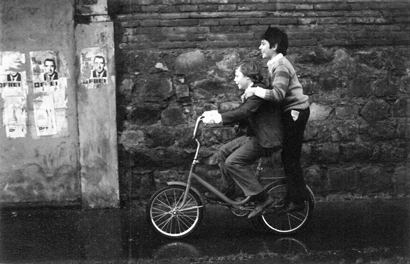Latin American film explores familiar theme of class tensions, repression
“Machuca,” a Chilean film from director Andrés Wood, sends a stark warning that when political divisiveness morphs into a cultural war, the resulting chaos cannot be neatly resolved at the ballot box. The message conveyed in this superb film is important viewing for Americans of all political hues who express an interest in democracy’s spread.
Set in Santiago, Chile’s capital, in 1973, “Machuca” chronicles the toppling of Pres. Salvador Allende’s democratically elected socialist government by the Chilean military under Gen. Augusto Pinochet, in a bloody take-over aptly called “the Caravan of Death.” In the ensuing dictatorship, which lasted for 17 years, it is estimated that Pinochet’s security forces murdered more than 4,000 political opponents, including dissidents within the military and police, many after being kidnapped and detained indefinitely. Thousands of other Chileans were jailed, tortured or driven into exile.
The wounds in Chilean society still fester.
Seen through the eyes of two eleven-year-old schoolboys, Gonzalo and Machuca, the world is a place of cruelty and kindness. Their coming of age is conditioned by the harsh realities of class prejudice and economic hardships. Freckle-faced Gonzalo, an upper-class boy, nicknamed “Strawberry Face,” forges an unlikely friendship with a scruffy scholarship student, Pedro Machuca, who is known by his surname (perhaps an allusion to “Don Quixote,” in which a knight is dubbed Machuca, or “ he who crushes”) and whose worn-out clothes contrast sharply with the smartly tailored uniforms worn by Saint Patrick’s paying students. He is taunted and beaten by a gang of the school’s privileged boys, but his assertive, cheerful personality makes him a survivor and over time gains him grudging respect from snobbish classmates driven to school by their parents and pampered by their nannies. Father MacEnroe, the school’s socially crusading headmaster, dispenses tough love during lessons on social equality and justice that often fall on deaf ears. The truth is that children learn the opposite lessons all too quickly and to unlearn them takes much longer.
In touching scenes, the boys explore each other’s worlds. Gonzalo follows Machuca to the slums and experiences the human kindness possible in a poor family’s tin shack that contrasts sharply with the comfortable, but cold surroundings in his own luxurious home. The glow of warmth between the two boys is soon shattered when Machuca’s father, in an alcoholic confrontation, tells the boys that their friendship is doomed.
“ Kids and drunks don’t lie. In ten years, you, Gonzalo, will be working in your father’s company; and you, Machuca, will be cleaning toilets,” the man says. “In 20 years, Gonzalo, you will own that company, but Machuca, you will still be cleaning toilets and Gonzalo won’t even remember your name.”
The boys look at the man in disbelief, but his prediction proves to come true much sooner than the boys feared.
“Machuca” abounds with scenes of beauty and dramatic sensitivity. Silvana, a young female neighbor of Machuca’s, engages in a mini-seduction of both boys by means of introducing them to open-mouth kissing sweetened with hard-to-find condensed milk. Later, in an emotionally wrenching moment, after Silvana has been shot by Pinochet’s military goons, Gonzalo walks along the waterside where they had their innocent tryst and finds the crumpled, rusted milk container wedged between two rocks.
In another compelling scene, Father MacEnroe “de-consecrates” the school chapel by eating the entire communion wafers in the tabernacle, an act for which priests and nuns are trained, to prevent sacrilege by an invading force, in this case fellow Catholics.
The power of these child actors–– Matías Quer as Gonzalo and Ariel Mateluna as Machuca––is especially strong in the climatic confrontation between them when soldiers are razing Machuca’s slum. Confronted by a soldier, Gonzalo proves that Machuca’s father was right. He points to his expensive clothes and says, “See, I don’t belong here.” The soldier lets him pass.
The look of betrayal on Machuca’s face is beyond description.
Produced on a shoestring budget––slightly over $1.5 million––this film is a triumph of unpretentious creativity with a powerful message for our troubled times.
gaycitynews.com


































